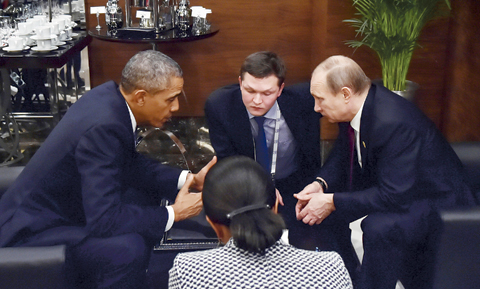 ANTALYA, Turkey: US President Barack Obama (left) speaks with Russian President Vladimir Putin (right) prior to the opening session of the G20 summit yesterday. — AP
ANTALYA, Turkey: US President Barack Obama (left) speaks with Russian President Vladimir Putin (right) prior to the opening session of the G20 summit yesterday. — APANTALYA, Turkey: World leaders united yesterday to denounce terrorism at a heavily-guarded summit in Turkey after the gun and bomb assaults in Paris, despite divisions over conflict-riven Syria. US President Barack Obama, Vladimir Putin of Russia, China's President Xi Jinping and other leaders gathered at the Mediterranean resort of Antalya two days after the Paris attacks claimed by Islamic State jihadists.
Obama condemned the killing of 129 people in Paris as well as a double suicide bombing in Ankara last month as attacks "on the civilized world" and vowed to "redouble our efforts" to eliminate the Islamic State network. "We stand in solidarity with France in hunting down the perpetrators of this crime and bringing them to justice," Obama declared after talks with his host, Turkish President Recep Tayyip Erdogan.
The Paris killings darkened the mood of the summit of the Group of 20 top world economies, with security and the Syrian conflict now eclipsing an economic agenda that will also deal with the spreading refugee crisis, climate change and tax avoidance. Erdogan said the summit agenda was now "very different" given the massacre in Paris, with the leaders to condemn the attacks in their communique or a separate statement. "I believe that our stance against international terrorism will find its expression in a very strong, tough message at the G20 summit," Erdogan said. "This terrorist action is not only against French people but all humanity."
Russia's Putin said that overcoming global terror was possible only "if all the international community unites its efforts". Putin is key to the gathering, which is taking place without French leader Francois Hollande who remains home to lead his shaken country in the aftermath of the attacks. Russia launched its own Syrian air campaign in September but the West suspects the Russian bombardment is aimed at propping up the regime of President Bashar Al-Assad, a difference that risks driving a wedge through the summit. European Union President Donald Tusk told reporters that Russian actions in Syria must be focused on Islamic State and not the anti-Assad opposition.
The summit saw the first encounter between Obama and Putin since Russia launched its Syrian air campaign. Their icy body language at previous encounters has grabbed as many headlines as their comments. A White House official said Obama and Putin agreed on the need for UN-sponsored peace talks and a ceasefire to resolve years of war in Syria. The two leaders spoke during a short and unannounced summit meeting over a coffee table. "President Obama and President Putin agreed on the need for a Syrian-led and Syrian-owned political transition, which would be preceded by UN-mediated negotiations between the Syrian opposition and regime as well a ceasefire," the official told reporters after the meeting.
The two "held a constructive discussion" that lasted about 35 minutes, the official added, calling the need for a solution for Syria "an imperative made all the more urgent by the horrifying terrorist attacks in Paris". The official, who wished to remain anonymous, said Obama welcomed efforts by all nations to confront Islamic State jihadists in Syria amid Western suspicions that Russia's intervention is really aimed at propping up Syrian President Bashar al-Assad.
A top Kremlin official said that while Moscow and Washington shared "strategic objectives" to fight Islamic State, divergences still existed. "Differences on tactics still remain," Putin's foreign policy advisor Yuri Ushakov told reporters on the sidelines of the summit. Obama also offered his "deep condolences for the loss of Russian life" in the bombing of a Metrojet passenger flight in Egypt killing all 224 people on board in Russia's worst air disaster.
Erdogan used the summit to cement his status as a global leader after winning a resounding victory in an election last month, held three weeks after a twin suicide bombing in Ankara that killed 102 people and was blamed on Islamic State militants. All musical events, including at the official dinner yesterday night, have been cancelled as a mark of respect for the Paris victims and Turkish state media said the already tight security at the summit was stepped up. Turkey is deeply opposed to Russia's air strikes but has received only a lukewarm reaction so far to its proposal for a safe zone free of Islamic State jihadists to be created inside Syria as a haven for refugees.
Top diplomats gathered in Vienna on Saturday agreed a fixed calendar for Syria that would see a transition government in six months and elections in 18 months but failed to agree on the future of Assad. The refugee crisis is a key topic at the summit here, with Turkey housing some 2.2 million Syrian refugees from the conflict but the European Union urging Ankara to do more to prevent migrants undertaking risky boat crossings to the EU.
European Commission head Jean-Claude Juncker warned that the attacks in Paris should in no way poison the sensitive debate over refugees. "Those who organised, who perpetrated the attacks are the very same people who the refugees are fleeing and not the opposite," Juncker said. Discussions on climate change will assume greater importance than usual coming just ahead of a UN conference in Paris that aims to agree a global pact to curb warming of the planet. - Agencies









